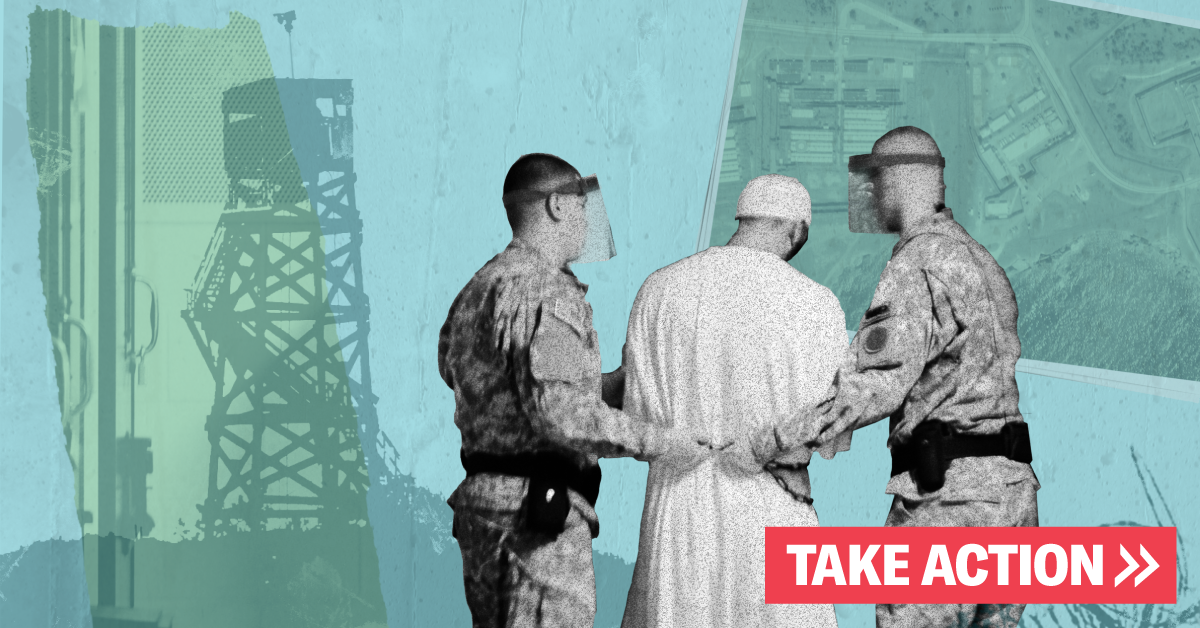Twenty years have passed since the first detainees arrived in Guantánamo Bay, making it the longest-standing war prison in U.S. history. Since 2002, 779 Muslim men and boys have been held at Guantánamo, nearly all of them without charge or trial. Today, 39 men remain indefinitely detained there, and 27 of them have never even been charged with any crime. Fourteen of those 27 have been cleared for transfer or release, some for years. Many of the remaining men are torture survivors; the CIA formerly disappeared some of them at “black sites” before our government sent them to Guantánamo. All of the prisoners have been exposed to the physical and psychological trauma associated with prolonged indefinite detention.
Around the world, Guantánamo is a symbol of racial and religious injustice, abuse, and disregard for the rule of law. Our government’s embrace of systematic torture shattered lives, shredded this country’s reputation in the world, and compromised national security. To this day, it has refused to release the full details of the torture program or to provide justice and redress for all the many victims.
As we mark this 20th anniversary, it is worth pausing to reflect on the fact that all the teenagers and many young adults alive today have never known a United States without the stain of Guantánamo. They’ve seen three presidents pledge to close the prison without following through on that promise. Guantánamo is now embedded not only in our conscience, but in American culture, as recent critically-acclaimed films about torture and its impact, like “The Report” and “The Mauritanian,” show. Yet too many think Guantánamo is in our past or even that amends for abuses have been made, as a Jeopardy question and response last year showed. In response to the clue, “In 2015 Congress authorized payments of $4.44 million to each of these people, $10,000 for each day of their captivity,” a Jeopardy! contestant wrongly answered “Guantánamo Bay prisoners.” There has been no such redress, and this shameful chapter of our history is still being written.
President George W. Bush transferred over 500 prisoners out of Guantánamo. President Barack Obama transferred approximately 200 men, and said he would shut the prison down, but failed. President Donald Trump reversed course and kept the prison open. Now it’s up to President Joe Biden to fulfill his pledge to finally close Guantánamo.
Last year, over 110 groups, which include 9/11 family members, urged President Biden to take concrete action. Their call joined a chorus that has ranged from the military to medical professionals, international jurists to human rights organizations and activists, to the late Sen. John McCain. Former government officials who support closure include five defense secretaries, eight secretaries of state, six national security advisors, five chairmen of the Joint Chiefs of Staff, and dozens of retired generals and admirals.
At a recent Senate Judiciary Committee hearing, Colleen Kelly, who lost her brother in the 9/11 attacks, told Congress that she hopes for “a resolution to the 9/11 Military Commission that provides answers to their questions, accountability for unlawful acts, justice too long denied, and a path to closing Guantánamo. Perhaps then, this long-festering, very personal yet collective national wound can truly begin to heal.” At the same hearing, Marine Corps Brigadier General John Baker, the Guantánamo military commissions’ chief defense counsel emphasized, “It is too late in the process for the current military commissions to do justice for anyone. The best that can be hoped for at this point, more than 20 years after the crimes were committed, is to bring this sordid chapter of American history to an end. And that end can only come through a negotiated resolution of the cases.”
The path forward is clear and achievable. President Biden has all the authority he needs to close Guantánamo in a way that reckons withs the harm done to men who have been tortured and imprisoned without charge or fair trials for two decades, while providing a measure of justice and resolution for victims’ family members. His administration can start by appointing a top level official who is specifically tasked with closing Guantánamo and is empowered to do so. It can transfer detainees who have not been, nor will be, charged with a crime to other countries where their rights will be respected and they can receive medical care and support services. Finally, if the government has enough evidence that is untainted by torture to prosecute prisoners — including those facing the death penalty — it should pursue plea agreements to finally resolve cases.
Twenty years ago, now- retired Marine Corps Major General Michael Lehnert was tasked with building the first cells at Guantánamo and setting up the prison. He told Congress at the Senate Judiciary Committee hearing that the failure to close Guantánamo is now a painful reflection of this nation’s values in the last 20 years: “Who we are cannot be separated from what we do.”
The prisoners at Guantanamo — and indeed our nation — have lived with the legal and moral stain that the prison represents for far too long. We can’t look away from what our country has done. We need to face it and shut it down.
